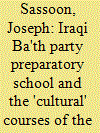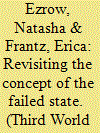|
|
|
Sort Order |
|
|
|
Items / Page
|
|
|
|
|
|
|
| Srl | Item |
| 1 |
ID:
131564


|
|
|
|
|
| Publication |
2014.
|
| Summary/Abstract |
This article reads Bashar al-Asad's rule through the prism of social activism and, in particular, through the field of charities. The sociopolitical transformations Syria experienced between 2000 and 2010-the shift in state-society relations, the opening of the civic arena, and economic liberalization-are explored through the activities of charitable associations, including their interactions with other Syrian actors, and we argue that they reflect the unraveling of the old social contract. The Syrian leadership outsourced important state welfare functions to charities while also creating nongovernmental organizations (NGOs) under its own control and supporting developmental NGOs loyal to the regime. These NGOs differed from the existing charities in terms of their social base, financial backgrounds, motivations, modes of institutionalization, and public relations strategies, and enabled the authoritarian regime to pursue a new strategy of divide-and-rule politics. At the same time, subcontracting poor-relief measures to charities eroded the regime's political legitimacy and helped sow the seeds of the 2011 uprising.
|
|
|
|
|
|
|
|
|
|
|
|
|
|
|
|
| 2 |
ID:
128208


|
|
|
|
|
| Publication |
2014.
|
| Summary/Abstract |
Political indoctrination of the Ba'th party cadre in Iraq was critical for the durability of the regime for 35 years. The party preparatory school was the vehicle for the ideological training of the party elite, while special courses, provided by the party branches, focused on the 'cultural' education of the party's lower echelons to prepare them for becoming active members. Using the Ba'th's own archives, the article examines how the party's school, the branches' cultural courses, and the Ba'th cultural activities, combined to create an ideologically educated cadre which paved the way for the party's domination of Iraq's culture and ideology.
|
|
|
|
|
|
|
|
|
|
|
|
|
|
|
|
| 3 |
ID:
124181


|
|
|
|
|
| Publication |
2013.
|
| Summary/Abstract |
The policy and donor communities have placed great importance on fixing 'failed states'. World leaders have cited failed states as one of the greatest threats to the global community. Nevertheless the concept of the failed state is currently subject to a backlash from the academic community. Scholars have criticised the failed states literature on theoretical, normative, empirical and practical grounds. We provide a brief overview of these main concerns and offer a more systematic method for measuring 'state failure'. Coming up with better ways of assessing how states underperform will enhance our understanding of how institutional decay affects stability and development and, most importantly, will provide an improved system of early warning for practitioners.
|
|
|
|
|
|
|
|
|
|
|
|
|
|
|
|
| 4 |
ID:
132933


|
|
|
|
|
| Publication |
2014.
|
| Summary/Abstract |
Based on extensive archival researc-h with newly available Iraqi state and Ba'th Party doctmzents, this article attempts to shed light on the Saddam. Husayn regime '3 relationship with lslamists and lslamism, arguing that it ir1strumenta.lizecl Islam in its foreign policy to an unprecedented extent, but not out of ideological conviction. This article, therefore, clari?es an important issue in the historiography of Saddam 's Iraq and suggests that religion can play a concrete role in international relations.
|
|
|
|
|
|
|
|
|
|
|
|
|
|
|
|
|
|
|
|
|